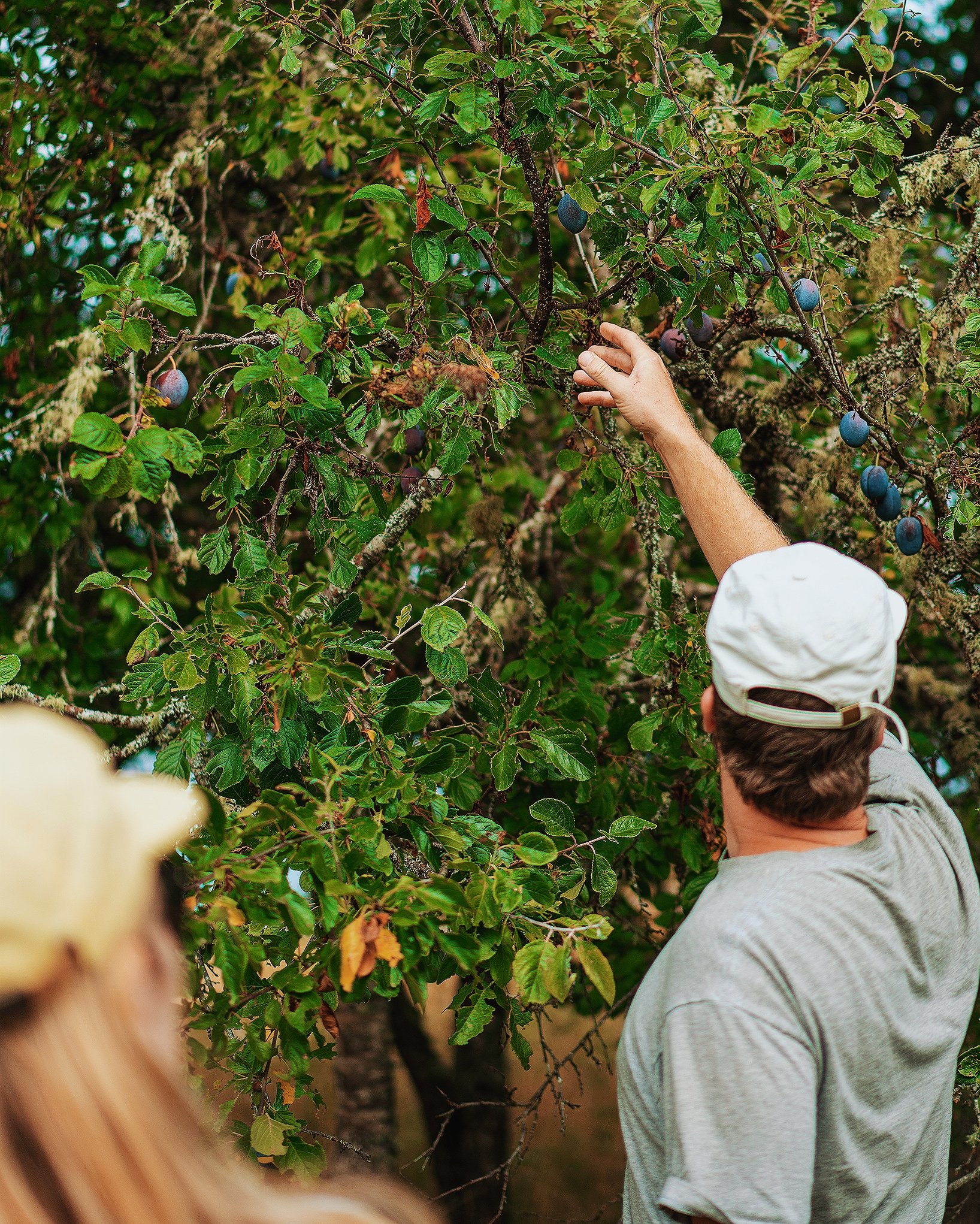A Glass of Orange Wine
What does it take to make your own wine commercially? Big dreams, more capital than you probably imagine, hard work, patience and perseverance, plus a dash of good luck—and then some. However, a small winery and newly planted vineyard on the northeastern shore of Salt Spring Island shows it can indeed be done—and is surely one of Canada’s more innovative winery models.
Born of owners Sam Milbrath and Mike Shindler’s shared love of food and wine, a Sunday in August sells its wines mainly online. The pair source their grapes from small, organic vineyards mainly in the Okanagan and Similkameen Valleys but also, increasingly, from the Saanich Peninsula. They make wines with minimal intervention—now commonly referred to as "natural wines"—produced with few, if any, of the more commonly used additives. And their popularity, especially "orange" or "amber" wines (where white grapes are left on the skins for an extended period), continues to grow.
The process harks back to winemaking’s beginnings, when grapes were whole cluster fermented in clay amphorae. Shindler and Milbrath’s modern approach is to make a lighter, more accessible orange style fermented and aged in stainless steel. Using a shorter period of maceration, the process can transform some white varieties into more nuanced wines, explains Shindler. Ever popular Pinot Gris, for instance, “can be a little bit boring but if you macerate it to give it a little bit more texture and some really nice colour, it can still have that white wine freshness—but with a little more fruitiness that makes it a more interesting wine.”
Small beginnings
While searching for their dream property, the couple thought they should at least start by making some wine. To that end they worked hard to connect with growers who held close the same sustainable philosophies. Despite limited winemaking experience they forged ahead and produced their initial wines, in 2016, under another winery’s license—a common practice. They made “very little wine. But it sold really well,” says Shindler. Still based in Vancouver, he went back and forth between spending harvests in the Okanagan and making sales in the city.
“I didn't even have a car. I was renting a car to go to the Okanagan and I was riding my bike from restaurant to restaurant or wine stores,” he says. As interest in a Sunday in August grew, “Very slowly, people started to resonate with the way we were making wine and what we were doing; and it just went from there. And every year we tried to make a little bit more, then a little bit more.”
They continued to make those earlier vintages on the Naramata Bench and in Kelowna’s Mission District. Yet it was always the pair’s intention to establish a Sunday in August on the coast. It turned out that Salt Spring was a natural choice, says Milbrath. “I’m from Victoria. We’ve always liked the Gulf Islands and got married on Salt Spring,” she explains. “We found our happy place. It’s a nice mix, with the most amenities and good infrastructure.” Salt Spring’s proximity to Vancouver and Victoria was another good reason. And the home they eventually found in 2021 was perfect. “This place had what we were looking for, a little house, plus water and sunlight. It just spoke to us.” It also sits on 20 acres that now accommodates a small vineyard planted to Chardonnay, Pinot Noir and Gamay.

.jpg)
A shift to the coast
Originally, the couple had intended to source most of their grapes from the Okanagan and Similkameen. However, following the devastating impact of the last two winters, their plans have changed somewhat. “We’ve been working hard to figure out other grape sources on Vancouver Island,” says Mike, who reckons it will still be a few more years until their estate vines are producing on any realistic scale. Also, with supply issues and the onset of climate change, they’ve planted a second vineyard. “The growing conditions here are different with no issues. In fact the whole industry is starting to look at Vancouver Island. There’s now a lot of competition to purchase grapes here,” he says.
While Shindler handles the winemaking, focuses on the vineyard and sources fruit, Milbrath brings to the partnership her strong marketing skills and photography background, evident in the brand’s truly distinctive packaging. The name "a Sunday in August" came from Mike’s personal Instagram account, she explains. “We liked the idea that it was really fun and inviting, and that it spoke to the ethos of making wine that’s approachable and not too stuffy; suggesting something bright and fresh that you can drink year round—really crushable,” she says with a laugh. There’s also a strong family connection as Milbrath’s sisters are both visual artists, whose work features prominently on several of the brand’s distinctive labels.
A natural progression
Though natural wine lovers are spread out across Canada and around the world, it’s still a close knit community. So much so, that news of a Sunday in August’s early successes (including a perennially sold-out orange Pinot Gris) traveled fast. The wines are now available in BC, Alberta, Manitoba, Ontario and Quebec—growth that’s come thanks in no small part to Instagram, says Milbrath.
Is there a conventional tasting room in the winery’s future? The couple say it’s an idea to which they’ve given plenty of thought. However, “for us to be able to work all week it’s a little bit daunting: to do all this as well as run a tasting room is a challenge.” In short, “We might, down the road,” they say. “But first and foremost we’re winemakers, before we enter more into tourism and hospitality.”





